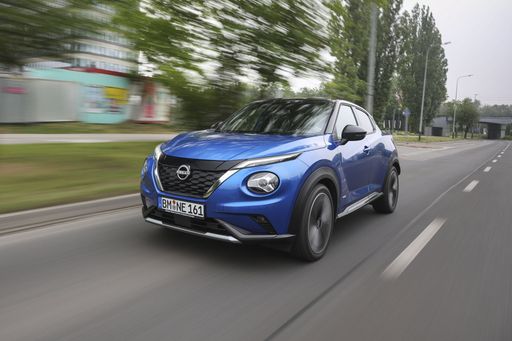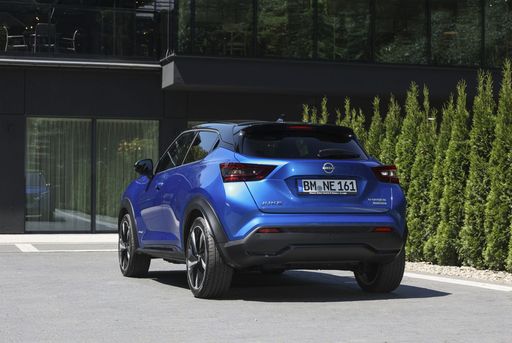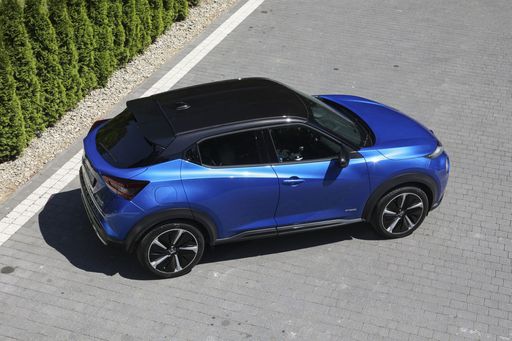Nissan Juke vs Toyota C-HR - Differences and prices compared
Compare performance (143 HP vs 223 HP), boot space and price (21400 £ vs 29100 £ ) at a glance. Find out which car is the better choice for you – Nissan Juke or Toyota C-HR?
Costs and Efficiency:
Looking at overall running costs, both models reveal some interesting differences in everyday economy.
Nissan Juke has a clearly perceptible advantage in terms of price – it starts at 21400 £ , while the Toyota C-HR costs 29100 £ . That’s a price difference of around 7749 £.
Fuel consumption also shows a difference: Toyota C-HR manages with 0.80 L and is therefore decisively more efficient than the Nissan Juke with 4.70 L. The difference is about 3.90 L per 100 km.
Engine and Performance:
Under the bonnet, it becomes clear which model is tuned for sportiness and which one takes the lead when you hit the accelerator.
When it comes to engine power, the Toyota C-HR has a noticeable edge – offering 223 HP compared to 143 HP. That’s roughly 80 HP more horsepower.
In acceleration from 0 to 100 km/h, the Toyota C-HR is noticeable quicker – completing the sprint in 7.40 s, while the Nissan Juke takes 10.10 s. That’s about 2.70 s faster.
There’s no difference in top speed – both reach 180 km/h.
Space and Everyday Use:
Cabin size, boot volume and payload all play a role in everyday practicality. Here, comfort and flexibility make the difference.
Both vehicles offer seating for 5 people.
In curb weight, Nissan Juke is to a small extent lighter – 1274 kg compared to 1505 kg. The difference is around 231 kg.
In terms of boot space, the Toyota C-HR offers barely noticeable more room – 447 L compared to 422 L. That’s a difference of about 25 L.
In maximum load capacity, the Nissan Juke performs to a small extent better – up to 1305 L, which is about 150 L more than the Toyota C-HR.
When it comes to payload, Nissan Juke minimal takes the win – 427 kg compared to 425 kg. That’s a difference of about 2 kg.
Who wins the race in the data check?
The Toyota C-HR is decisively ahead in the objective data comparison.
This result only shows which model scores more points on paper – not which of the two cars feels right for you.
Costs and Consumption
View detailed analysis
Engine and Performance
View detailed analysis
Dimensions and Body
View detailed analysis

Toyota C-HR
Nissan Juke
The Nissan Juke is a pocket-sized crossover that refuses to blend in, with quirky styling and a cheeky stance that turns heads at every traffic light. It’s ideal for shoppers who value personality and nimble urban driving over maximum practicality, delivering surprising pep and a well-equipped feel for everyday fun.
details



Toyota C-HR
The Toyota C-HR cuts a striking figure with its angular styling and coupe-like profile, so you’ll never go unnoticed in the supermarket car park. It balances everyday practicality with a nimble, city-friendly personality, making routine commutes feel a touch more fun without asking for forgiveness.
details




Costs and Consumption |
|
|---|---|
|
Price
21400 - 30100 £
|
Price
29100 - 42800 £
|
|
Consumption L/100km
4.7 - 6 L
|
Consumption L/100km
0.8 - 5.1 L
|
|
Consumption kWh/100km
-
|
Consumption kWh/100km
-
|
|
Electric Range
-
|
Electric Range
68 km
|
|
Battery Capacity
0.60 kWh
|
Battery Capacity
-
|
|
co2
107 - 136 g/km
|
co2
17 - 115 g/km
|
|
Fuel tank capacity
46 L
|
Fuel tank capacity
43 L
|
Dimensions and Body |
|
|---|---|
|
Body Type
SUV
|
Body Type
SUV
|
|
Seats
5
|
Seats
5
|
|
Doors
5
|
Doors
5
|
|
Curb weight
1274 - 1405 kg
|
Curb weight
1505 - 1755 kg
|
|
Trunk capacity
354 - 422 L
|
Trunk capacity
350 - 447 L
|
|
Length
4210 mm
|
Length
4362 mm
|
|
Width
1800 mm
|
Width
1832 mm
|
|
Height
1593 mm
|
Height
1558 - 1564 mm
|
|
Max trunk capacity
1237 - 1305 L
|
Max trunk capacity
1076 - 1155 L
|
|
Payload
405 - 427 kg
|
Payload
375 - 425 kg
|
Engine and Performance |
|
|---|---|
|
Engine Type
Petrol, Full Hybrid
|
Engine Type
Full Hybrid, Plugin Hybrid
|
|
Transmission
Manuel, Automatic
|
Transmission
Automatic
|
|
Transmission Detail
Manual Gearbox, Dual-Clutch Automatic, Automatic Gearbox
|
Transmission Detail
CVT
|
|
Drive Type
Front-Wheel Drive
|
Drive Type
Front-Wheel Drive, All-Wheel Drive
|
|
Power HP
114 - 143 HP
|
Power HP
140 - 223 HP
|
|
Acceleration 0-100km/h
10.1 - 11.8 s
|
Acceleration 0-100km/h
7.4 - 9.9 s
|
|
Max Speed
166 - 180 km/h
|
Max Speed
175 - 180 km/h
|
|
Torque
200 Nm
|
Torque
-
|
|
Number of Cylinders
3 - 4
|
Number of Cylinders
4
|
|
Power kW
84 - 105 kW
|
Power kW
103 - 164 kW
|
|
Engine capacity
999 - 1598 cm3
|
Engine capacity
1798 - 1987 cm3
|
General |
|
|---|---|
|
Model Year
2024
|
Model Year
2024 - 2025
|
|
CO2 Efficiency Class
D, E, C
|
CO2 Efficiency Class
C, B
|
|
Brand
Nissan
|
Brand
Toyota
|
What drive types are available for the Nissan Juke?
Available configurations include Front-Wheel Drive.




